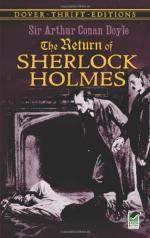“Well, I am not so clear about that, Watson, for it is evident that they must either kill her or else secure her in such a way that she could not give immediate notice of their escape. But at any rate I have shown, have I not, that there is a certain element of improbability about the lady’s story? And now, on the top of this, comes the incident of the wineglasses.”
“What about the wineglasses?”
“Can you see them in your mind’s eye?”
“I see them clearly.”
“We are told that three men drank from them. Does that strike you as likely?”
“Why not? There was wine in each glass.”
“Exactly, but there was beeswing only in one glass. You must have noticed that fact. What does that suggest to your mind?”
“The last glass filled would be most likely to contain beeswing.”
“Not at all. The bottle was full of it, and it is inconceivable that the first two glasses were clear and the third heavily charged with it. There are two possible explanations, and only two. One is that after the second glass was filled the bottle was violently agitated, and so the third glass received the beeswing. That does not appear probable. No, no, I am sure that I am right.”
“What, then, do you suppose?”
“That only two glasses were used, and that the dregs of both were poured into a third glass, so as to give the false impression that three people had been here. In that way all the beeswing would be in the last glass, would it not? Yes, I am convinced that this is so. But if I have hit upon the true explanation of this one small phenomenon, then in an instant the case rises from the commonplace to the exceedingly remarkable, for it can only mean that Lady Brackenstall and her maid have deliberately lied to us, that not one word of their story is to be believed, that they have some very strong reason for covering the real criminal, and that we must construct our case for ourselves without any help from them. That is the mission which now lies before us, and here, Watson, is the Sydenham train.”
The household at the Abbey Grange were much surprised at our return, but Sherlock Holmes, finding that Stanley Hopkins had gone off to report to headquarters, took possession of the dining-room, locked the door upon the inside, and devoted himself for two hours to one of those minute and laborious investigations which form the solid basis on which his brilliant edifices of deduction were reared. Seated in a corner like an interested student who observes the demonstration of his professor, I followed every step of that remarkable research. The window, the curtains, the carpet, the chair, the rope—each in turn was minutely examined and duly pondered. The body of the unfortunate baronet had been removed, and all else remained as we had seen it in the morning. Finally, to my astonishment, Holmes climbed up on to the massive mantelpiece. Far above his head hung the few inches of red cord which were still attached to the wire. For a long time he gazed upward at it, and then in an attempt to get nearer to it he rested his knee upon a wooden bracket on the wall. This brought his hand within a few inches of the broken end of the rope, but it was not this so much as the bracket itself which seemed to engage his attention. Finally, he sprang down with an ejaculation of satisfaction.




